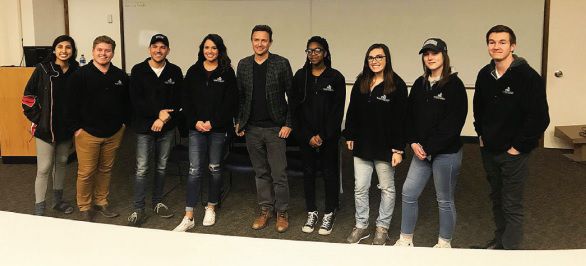Think twice before clicking ‘I agree’
March 12, 2018
There is a new joke making its way across social media about “the FBI agent” in every computer. While this originally began as a meme, it is much more of a reality than many realize.
Cullen Hoback is the creator of the film “Terms and Conditions May Apply,” a documentary that describes how social media sites and search engines exploit user information for profit. It also discusses the legal implications of the government’s free access to our information via third party applications.
Hoback spoke at Washburn March 5 and stressed to students the loss of control that occurs from the second you hit the “I agree” button on a terms and conditions box.
“Many applications ask for permission to access information on your computer or device that doesn’t make sense for what the application is doing,” Hoback said. “If a flashlight app is asking for access to your microphone, camera, contacts, don’t allow it.”
Hoback explained to students how much popular sites that connect us, such as Facebook and Google, have changed their privacy policies without really making users aware. Any statements concerning changes are written using terminology that is not user friendly. These sites actually generate money by sharing user information with companies they have partnerships with.
Think back to any organization that you have clicked the ‘like’ button for their Facebook page. Companies are now aware of the things you like and dislike, your hobbies, your location and even information as personal as your sexuality. They then use these qualities to target specific demographics with advertisements. Social media and search engines make a profit for providing this information.
Hoback asked students in the audience during the presentation if many felt they had nothing to hide in terms of online information. As the majority of hands raised, general consensus changed throughout the lecture as Hoback explained that the lack of privacy is not just an issue concerning companies exploiting users, it is also a legal issue.
Hoback then chose one of the students out of the audience who raised his hand when asked if he had nothing to hide. Erasmo Nunez, sophomore, mass media major, stood at the front and answered a series of personal questions to show just how intimate the information internet users have shared through private conversations, likes and browser history without distinctly knowing they are sharing.
Nunez was able to answer personal questions such as his number of sexual partners and his view on abortion honestly in front of a crowd of people. However, this drove the point home to uncomfortable audience members that their habits and views are easily accessed by companies and the government without their explicit permission.
“The government has access to any information you share with a third party application,” Hoback said. “ This was made possible by Congress, and is known as the Third Party Doctrine. Once you’ve shared information with a third party application, you’ve essentially given up your right to this information.”
This legal theory was held up in a 2012 Maryland District Court case United States v. Graham. It was ruled that an individual has no reasonable expectation to privacy once their information is shared with a third party application. This theory challenges the Fourth Amendment, which guarantees an American the right to privacy.
“The rights that we are provided in the physical world have not followed us over into the digital realm,” Hoback said. “So when you’re visiting a website, the terms and conditions are basically the constitution to that site. The fourth amendment does not apply.”
Emma Staats, sophomore criminal justice major, was also chosen out of the audience to have her Google search history viewed on the projector. Hoback used this moment to show how transparent we have allowed the government to make us. It may not seem like a big deal to have your search history viewable by entities without a face, but when you sit in a room and are having it viewed publicly, there is a sudden awareness of all the privacy and control we relinquish by engaging in search engines like Google, that have no regard for personal privacy.
How can a social media user prevent their information from being exploited? Hoback recommends using search engine applications that cost money, but do not share your information. For example, Duckduckgo is one search engine application that costs a few dollars each month, but keeps your information out of unknown hands.
“All of your search history – if you have porn habits, the government has access to that as well,” Hoback said. “All of this information could be leveraged against you in the future. You don’t know where your future is going to go, you don’t know what you’re going to do with your life necessarily, and you don’t want all of this information to be held over your head.”



